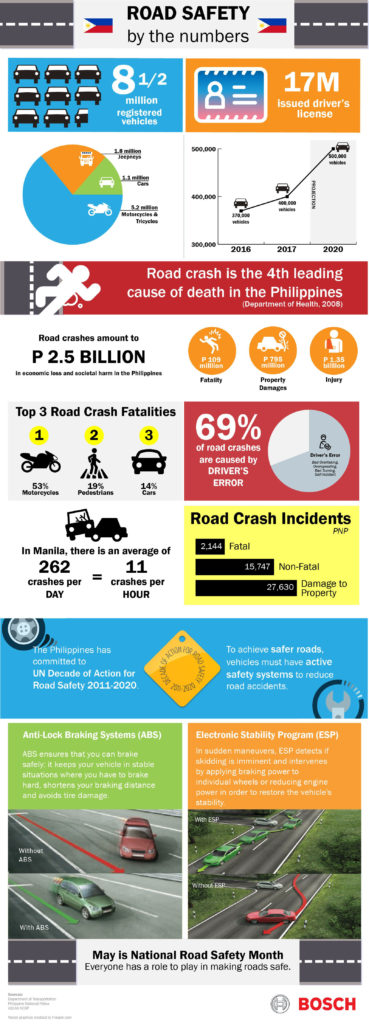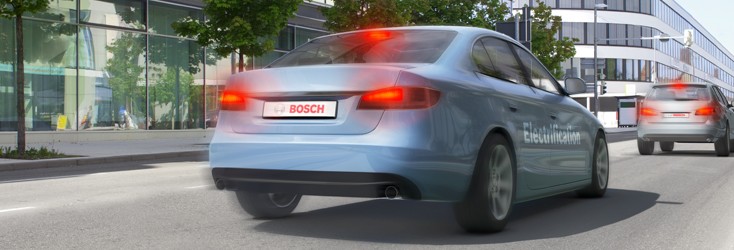Leading global supplier of technology and services Bosch recently discussed the needs of local automotive industry and government to seriously consider implementing legislative policies that will mandate the use of active safety systems in all vehicles in the Philippines.
During the 7th ASEAN-NCAP Automobile Safety Forum, Andrew Powell, Managing director of Bosch Philippines, recommends that vehicle safety technologies, such as Antilock Braking System (ABS) or Electronic Stability Program (ESP), need to be required as standard fittings across all new vehicles entering the Philippine market.

“As one of the world’s leading automotive suppliers, we believe that the most substantial impact the auto industry can make is to produce safer vehicles equipped with modern accident-prevention systems such as ABS and ESP. We envision a world of accident-free driving, and for many decades, Bosch has been working on in-vehicle technological advancements to realize this vision,” explained Powell.
Organized by the New Car Assessment Program for Southeast Asia (ASEAN NCAP) and in partnership with the Automotive Association of the Philippines (AAP), the event addresses road safety goals declared in the United Nation’s Decade of Action for Road Safety 2010-2020. The group assesses the safety level of vehicles being sold in the region, with a vision to elevate motor vehicle safety standards and encourage a market for safer vehicles. Most of Southeast Asia has yet to make safety features such as ABS and ESP mandatory in passenger cars and motorcycles. To date, Malaysia is the first and only ASEAN member country to mandate all new cars to be equipped with ESP from 2018 onwards.
MODERN SAFETY FEATURES PREVENT CAR ACCIDENTS
To achieve safer roads, vehicles must have both active and passive safety systems. Passive safety systems provide driver and passenger protection in the event of a crash, such as crumple zones, seatbelts, airbags and child restraints to name a few. On the other hand, active safety systems reduce – if not prevent – road crash incidence through built-in technologies that interpret signals from various sensors to help the driver control the vehicle.
In 1978, Bosch pioneered the world’s first antilock braking system (ABS) for passenger cars. Critical traffic situations, such as sudden traffic jams or obstacles on the road, are now common with increased mobilization, particularly in urban cities. ABS prevents a car’s wheels from locking during an emergency braking scenario, thus ensuring the driver maintains steering control and stability.
In 1995, Bosch was again the first company to launch the Electronic Stability Program (ESP) to the market as the most comprehensive braking control system, and is today equipped in 64-percent of all new cars worldwide. In sudden maneuvers, ESP detects if skidding is forthcoming and intervenes by applying braking power to individual wheels or reducing engine power in order to restore the vehicle’s stability. In Europe alone, ESP has saved more than 8,500 lives and prevented more than a quarter of a million traffic accidents to date.
ROAD SAFETY: LONG-TERM COMMITMENT
According to Department of Transportation (DoTr), a total of P2.25-billion economic loss has been attributed to nationwide road accidents in the last 6 months alone. Sadly, road accidents claim the lives of 5 Filipinos each day. The Philippine National Police reports 32,269 road crash incidents in 2016, 6.6-percent of which have been fatal. Data also indicates that more than half of road casualties involve 2-wheeled vehicles.
As car ownership in the Philippines continues to expand by approximately 4-percent annually, there is a greater need to update the code on vehicle safety and ensure stricter enforcement of road safety regulations. As such, the Department of Transportation (DoTr) has embarked on a 5-point Road Safety Action Plan for the next 6 years that will aim to reduce road accident death rate by at least 20-percent by 2022.
Powell further explained, “Bosch lauds the Philippine government for its new initiatives. However, road-safety is long-term commitment that needs the support and involvement of other stakeholders such as the scientific community, NGOs, the industry and the general public.”
“The improvement of road safety is not something that will happen overnight. There is still much to be done and Bosch is committed to actively contribute to this ongoing collective effort,” said Powell.

